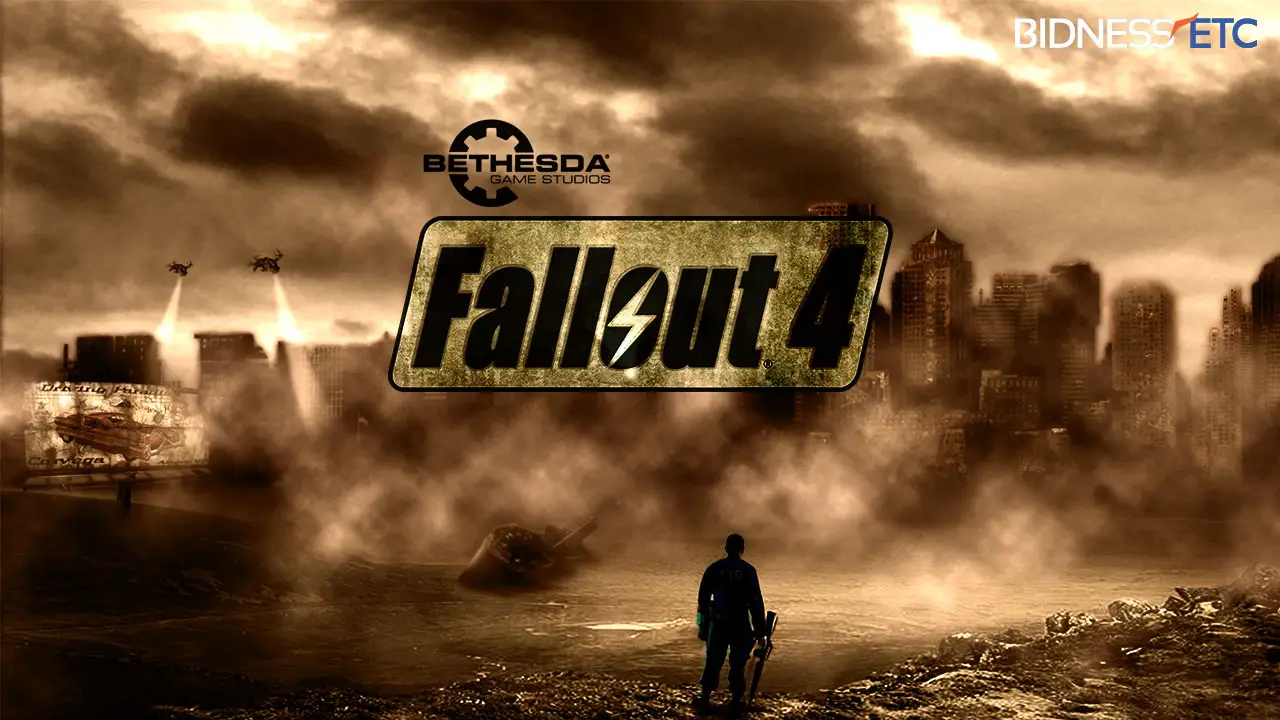The Twisted, Campy, DIY Gameplay of Fallout 4 Makes It Spellbinding
“My eyes are dry and my back is sore from leaning into the screen and not blinking.”
By Al Vanderklipp, University of Northwestern Michigan
Fallout 4 begins in white picket-fence neighborhood that could easily be mistaken for Cold War America (if you ignore the cheerful robot butler).
You get to start your day as an average citizen, and witness panic spread through your neighborhood after a man on TV solemnly announces that a nuclear bombardment of your country has begun. It’s an especially sobering moment that sets the tone for the story, and reminds you of the threat we faced back then (and still face today).

Fallout’s alternate history of the U.S. is just as interesting as the game itself. After nuclear bombs were dropped on Hiroshima and Nagasaki during World War II, we embraced the atom, and as a result, the atomic era never ended.
Everything ran on nuclear fusion, and the old-fashioned American values of patriotism and consumption never slowed, driving the world to an all-out war in 2077. This particular game takes place hundreds of years later, in a burnt-out version of Boston, full of tiny new governments, factions and religions.
If you’re new to the series and are thrown off by the “4” in the title, don’t worry. This may be a sequel, but the story always starts fresh: in each installment, your character is just as clueless as you, escaping a sealed bomb shelter (a “vault”) to discover a radiated, devastated version of the world left behind.
Decrepit motels house cheesy furniture and starburst carpeting.
Cheerful billboards and ancient magazines look like they were ripped directly from some space-age kid’s sci-fi fantasies.
Even the game’s grimmest outposts have reminders of that tacky warmth that our version of America has left long behind. The exception here is some of the game’s tech, which looks like it was ripped directly from Ridley Scott’s Alien–the gadgets and electronics look slightly more “modern,” (think early 80s) and make up a large part of Fallout 4’s story.
Almost every building you enter is home to a series of hidden, glowing, nuclear-powered computer terminals. A short hacking mini-game allows you to gain access to the contents, and these may well be the best part of the game. For every long-abandoned corporation, there is a story of corruption, inter-office relationships or insanity to be uncovered.
In one or two screens of lime-green text, these desktop computers tell complex and chilling stories about the dramas in other peoples’ lives before and after the bombs fell. In one facility, I read about a government contract for a pre-war Mars mission gone awry–in another, a story of a wasteland kidnapping case that ended in a grisly accidental death.
It’s fascinating and depressing to learn about the scientific accomplishments, comic book shipments, and TV productions that lost all value with nuclear devastation, and about the pettiness and pointless violence of a lawless world that hasn’t forgotten its roots so much as it has stopped caring about them.
Uncovering these voyeuristic little narratives is just a part of what the game does better than any other: giving the player a sense of real discovery. The dead city is teeming with secrets in caves, gas stations, and houses. Weapons, treasures, monsters and characters are all lying in wait to be stumbled upon as you wander aimlessly or get sidetracked off the main story, and every single time it’s a rush.
You’ll come across people with important-sounding names that, had you discovered them earlier or later, might have spoken or traded with you, but as a result of an action you took elsewhere, will shoot you on sight. You’ll hear fragments of conversation interrupted by a pack of wild dogs or feral humans. You might be asked to clear out a building full of 9-foot tall mutants, only to find that someone else is in the process of doing the job for you.
No two people playing Fallout 4 are going to have the same experience. The mistakes you make are permanent, and every action has consequences, but the quick pace of the storylines and enormous map make it hard to dwell on any one incident for too long. If you and a friend are playing at the same time, you’ll both have crazy and entertaining stories about the moments that’ve happened to you so far, whether they were intended by the designers or not.
As your character becomes the most important person in post-apocalyptic Boston, you’ll learn more about the history of the people and places you encounter, and it’ll start to feel more and more like a real place.
Which, of course, it isn’t. Fallout 4 is a role-playing video game, and it does that exceedingly well–you’re given options to be anything from a rational, moral human being to a complete sicko, allowing you to live the life of any kind of person you can imagine.
But on the whole, as a video game, it’s pretty unpolished, especially by modern standards.
Bad animations and glitches riddle the game when it’s least convenient. The game has an annoying tendency to autosave right before you die, forcing you to go back in time and play the same part over again. Confusing menus and cumbersome (but customizable!) controls only add to the hassle.
However, there’s something about manipulating the game’s faults that’s strangely appealing. The tools given to you in the form of slow-mo aiming, occasionally dim-witted A.I. and your portable computer (the Pip-Boy 3000 Mk. IV) allow you to win fights by the skin of your teeth. It should feel like cheating, but the more invested you are in the game’s world, the more satisfying it feels to outsmart it. In a age where new games cost hundreds of millions of dollars to produce, it’s almost refreshing to spend time with something so charmingly clunky.
I’m already 20 hours into this immersive campaign, and already I’ve escaped the clutches of a scam cult, been assaulted by man-sized scorpions in an army base, rescued a psychotic artist from spiky-haired raiders, and become addicted to every kind of drug in the wasteland– and I’ve barely touched on the main story. Every horrific scenario this game has thrown my way is spellbinding.
My eyes are dry and my back is sore from leaning into the screen and not blinking, and that’s unfortunately not an exaggeration–I haven’t been this immersed since my parents ended their 7-year embargo on video games, and bought me a Game Boy for Christmas.
Fallout 4 is some of the sickest, campiest, most creatively crafted fun to be had on this generation of consoles, and if you’re not playing it now, you’re missing out on a brilliantly conceived narrative that changes based on the kind of person you want to be.











[…] has also announced that the map in “Fallout 76” will be four times larger than the map in “Fallout 4.” If nothing else has excited the player about the new release, this piece of information should. […]